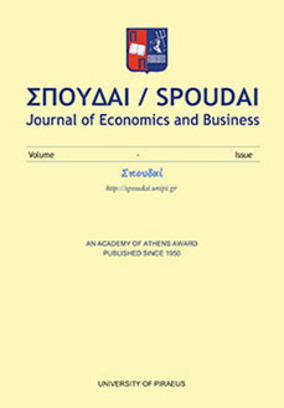Η “νέα βιομηχανική στρατηγική”. Η περίπτωση του κλάδου ένδυσης
Part of : Σπουδαί : journal of economics and business ; Vol.51, No.1-2, 2001, pages 65-96
Issue:
Pages:
65-96
Author:
Abstract:
In this article, we are investigating to what extend "the new industrial policy" which stems from the "new industrial strategy" of the operational industrial programme (1994-1999), is capable to contribute to the restructuring of garment manufacturing in Greece. The objective of this policy is that the branch should be able to improve, or at least maintain, its relative position in the "new competitive environment". The analysis carried out confirms that although the branch is found to be under a serious crisis, its prospectives could be auspicious under certain presumptions. Among these presumptions is included, the reorientation of the exercised industrial policy, regarding the branch. Based on the actual facts concerning the branch, the new industrial policy, which is based on tax exemptions and financial provisions, at best it can only bring short term and limited positive results. Instead we argue here that the state's role should be particularly inventive in its planning and should aim at the alteration of both the internal organization scheme and the strategy of the enterprises involved. It's major objective should be the maintenance and also the improvement of the branch's competence in the "new environment".
Subject:
Subject (LC):
Notes:
Περιέχει σημειώσεις και βιβλιογραφία, Ένα µέρος του άρθρου αυτού στηρίζεται σε έρευνα η οποία έγινε στα πλαίσια του προγράµµατος «Το Μέλλον της Ελληνικής Βιοµηχανίας» και αφορούσε το θέµα της δικτύωσης στον κλάδο ένδυσης στην περιοχή Ξάνθης, ∆ράµας και Καβάλας. Η µελέτη χρηµατοδοτήθηκε από το Υπουργείο Ανάπτυξης ως υποπρόγραµµα του επιχειρησιακού προγράµµατος βιοµηχανίας 1994-1999 και αποτελεί µιαν από τις 19 επιµέρους κλαδικές µελέτες που ανατέθηκαν για τη διερεύνηση της δυνατότητας ανάπτυξης «δικτύων» συγκεντρώσεων επιχειρήσεων ενός ή περισσοτέρων κλάδων σε µια γεωγραφική περιοχή. Επιστηµονικός υπεύθυνος της µελέτης ήταν ο Λόης Λαµπριανίδης και τα µέλη της µελετητικής οµάδας ήταν ο Γ. Ανδριάς, η Στ. Καραγιάννη και ο Π. Ρυλµόν.




